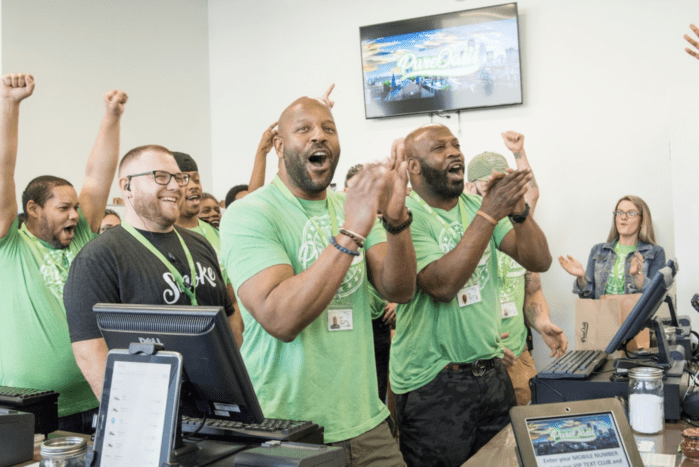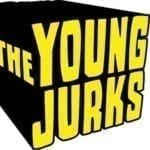
“I think Massachusetts will end up being a cautionary tale in terms of how you can do it, but other states will learn to do it better.”
Kobie Evans owns Pure Oasis with his business partner Kevin Hart. It’s the first black-owned cannabis dispensary in the City of Boston, and if that’s not a big enough accomplishment, the pair recently had a star turn on an episode of Patriot Act with Hasan Minhaj on Netflix.
Naturally, they know a lot about what cannabis equity looks like nationally and in Mass. I recently had Evans on my podcast, The Young Jurks, to touch on that issue and others including the recent break-in and robbery of Pure Oasis and other dispensaries.
Where do we start? The Netflix show? Governor Charlie Baker allowing you to re-open? Getting looted?
2020 has been a very interesting year … all these global and national things happened, and now we end up in the crosshairs of everything.
Like most people, we were watching the news on Sunday night [May 31] and seeing all the protests and went to bed feeling pretty good the protests were happening across town and [thinking] Pure Oasis was safe because we are, what, three to five miles away from where everything is happening? We just felt like we didn’t have much to worry about. Then you get a call in the middle of the night [that] there’s been an intrusion. It’s disheartening on a couple of different levels, but more so within the shadow of George Floyd losing his life and people protesting peacefully. There were a number of individuals who wanted to take advantage of that for personal gain. All across the city, different businesses were looted, damaged. It was kind of a gut punch.
Luckily there wasn’t much damage and we were able to open that same day. We weren’t sure about opening, but as we were out there cleaning the glass and assessing the damage, every other person, every other car stopped and asked about us. They were concerned, they were very vocal about the fact that this wasn’t neighborhood people because neighborhood people support Pure Oasis. We made the decision to open that day because we felt like we needed to be there for the community. If we close, [the thieves] win, and that’s not what we wanted. We wanted to be Boston Strong, to represent the strength of our community and the resolve. We’ve come this far and this isn’t going to stop us or slow us down.
Was it organized grand larceny?
It seemed like it was a concerted effort … it definitely seemed like it was very coordinated, at two o’clock in the morning on a Sunday night during a pandemic when everything is closed, I don’t think it was a sheer coincidence that all these people just happened to be out and about.
I hope that what happened to us doesn’t mar the peaceful protestors who are trying to be vocal and prove a point, we want to disconnect the two as much as possible albeit it happened during the time of the protest in no way do we see it as a direct connection between the two.
You are the first black-owned dispensary to open in Boston, and also the first recreational dispensary to open in Boston. That’s a lot of firsts.
That wasn’t our plan, but that’s how it worked out, and with that comes a greater responsibility. We want to uphold that.
What was being on Patriot Act like?
I was happy with the way the Netflix show came out because he didn’t make us look like idiots. Sometimes you are filming stuff and you cross your fingers and hope they will portray you in a positive light. Overall I was happy, shocked, and surprised how thorough and in-depth they were with their investigative journalism. They definitely put a comedic spin on it, but they do tend to hit the nail on the head. For somebody who is outside the realm, they did a good job at peeling back the layers, digging deep into the core of what a lot of people have been losing their mind over—relationships between some of the companies, the political aspects, and some of the inner workings of this machine that is rolling across the country and having a direct influence on who gets a license and who doesn’t.
The show labeled it a legal cannabis cartel. Do you think there is a cannabis cartel in Massachusetts?
That’s an interesting question. I think what the producers of the show were looking at was the nation as a whole, and when you look at the nation, Boston is a subset, and our rules and regulations with the Cannabis Control Commission will break up a cartel. I think that’s the intent of it, but different states don’t have that kind of teeth in the rules and regulations, so when you look at Florida, and they use that as a good example, when you have an entire state that is controlled by a small handful of organizations and the rules and regulations are only written to benefit them, then it may be appropriate. When you look at a state like Pennsylvania, Louisiana—when you see different states with the same players dividing up the pie equally among themselves—there’s a word that can be used for it, it’s very organized.
What’s holding the Massachusetts cannabis industry back?
I still feel like we are stymied by the whole community host agreement process. I still feel like that is a big barrier to any deliberate success when you look at the numbers overall of who is getting licenses and who’s sitting on the sidelines paying rent. There isn’t a lot of equity in the numbers when it comes to host agreements. I think Massachusetts will end up being a cautionary tale in terms of how you can do it, but other states will learn to do it better.
Would a state law mandating equity on a local city/town level help?
Absolutely. It’s this weird paradox where you have the state mandate for the CCC, but that process was dependent on the local municipality who had no mandate, or they decided that they didn’t have a mandate, so the sum of the total has to equal each part. If each part doesn’t have the same mandate, the net sum is always going to be zero because everybody isn’t playing by the same rules and that’s what we are seeing. Unfortunately, at the end of the day … despite the best intentions of the CCC, I think we are going to have a very hard time getting an A+ rating on the rollout of what voters voted for.
Any thoughts on Boston’s equity program?
My hope is Boston becomes a game changer. I hope that Boston looks at it from a lens that it helps out for many people who missed out in other places—in Brockton, Amesbury, and wherever else. I’m optimistic and hopeful. One of the deliberate steps in Boston is to take it out of the hands of one person and hopefully give it to a group of people that will look at it with a number of different factors and not just [base decisions] on who your attorney is and who you gave political donations to.
What would you like to see happen in Massachusetts?
We need more equity, we need a better representation of the cross sections, the people that live in this state as owners, we need more economic empowerment, we need more to stem the economic disenfranchisement that is happening. This is a great vehicle because it’s directly related to the war on drugs, it empowers people who have negatively impacted. These things are important and they are close—it’s something we can do immediately. I’ve talked to so many people who have an application with the CCC, but they’re waiting for a host community agreement. More equity creates a balanced group of people that can lend different backgrounds, different perspectives. There are some great people out there dying to get into this industry. They need to get in.
Mike Crawford is a Massachusetts medical cannabis patient and founder of The Young Jurks and midnightmass.substack.com. You can listen to The Young Jurks on iTunes or wherever else podcasts are streamed. This article was produced with support from Midnight Mass and The Young Jurks, where your contributions are greatly appreciated and help us deliver more local coverage.

